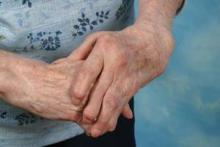Women with both hypothyroidism and inflammatory arthritis have a nearly fourfold greater risk of developing heart disease, compared with controls.
The finding adds to "sparse" data on the long-hypothesized association between hypothyroidism and inflammatory arthritis, and also "emphasizes the need for cardiovascular risk management in this case," wrote Dr. Hennie G. Raterman and colleagues in Annals of the Rheumatic Diseases, published online March 14.
Dr. Raterman of the department of rheumatology at the VU University Medical Center in Amsterdam and colleagues looked at more than 175,000 patients from the Netherlands Information Network of General Practice, retrieved from the electronic medical records of a representative sample of 69 general practices with 360,000 registered patients in 2006 (Ann. Rheum. Dis. 2012 [doi: 10.1136/annrheumdis-2011-200836]).
Patients younger than 30 years of age were excluded, given that cardiovascular disease is uncommon in this population. Morbidity data were derived from diagnostic coding, with codes for myocardial infarction, transient ischemic attack, and stroke/cerebrovascular accident indicating cardiovascular disease.
Overall, 1,518 (0.9%) of patients had inflammatory arthritis (including 973 females).
"In both male and female patients with inflammatory arthritis, hypothyroidism prevalence rates were significantly higher than in controls: 2.4% vs. 0.8% in male patients and 6.5% vs. 3.9% in female patients," wrote the authors, with an overall prevalence of hypothyroidism among inflammatory arthritis patients of 5.01% (vs. an overall 2.39 in controls, with P less than .0005).
The authors then calculated the prevalence of cardiovascular disease in this cohort. The analysis was restricted to female patients, however, "as there were too few men with both hypothyroidism and inflammatory arthritis to yield meaningful estimates."
They found that, after adjustment for age, hypertension, diabetes, and hypercholesterolemia, women with hypothyroidism plus inflammatory arthritis had an odds ratio of 3.72 for heart disease, compared with controls (95% confidence interval, 1.74-7.95).
That compared with an odds ratio of 1.48 for inflammatory arthritis alone (95% CI, 1.10-2.00) and 1.19 for patients with only hypothyroid (95% CI, 0.99-1.43).
According to Dr. Raterman, hypothyroidism acts on the cardiovascular system in several ways: by increasing oxidative stress and deteriorating endothelial function; and by decreasing nitric oxide production while increasing platelet activity, stimulating atherogenesis.
Additionally, "it is noteworthy that functional polymorphisms of protein tyrosine phosphatase N22 – a susceptibility factor for several autoimmune diseases such as hypothyroidism, inflammatory arthritis, and diabetes – accelerate atherosclerosis," wrote Dr. Raterman and his associates.
The authors cautioned that their study included several important limitations.
For one, "several CVD risk factors, such as lifestyle factors, family history of CVD, socioeconomic status, and ethnic background, were unavailable and could not be adjusted for in this study," they wrote.
Moreover, "we cannot exclude that part of our observed findings may be explained by an increased frequency of testing for thyroid disorders, as we and others previously described an increased prevalence of hypothyroidism in secondary care patients with RA."
Finally, they pointed out that the coding system used to identify inflammatory arthritis was unable to distinguish between different types, including rheumatoid arthritis, psoriatic arthritis, or ankylosing spondylitis.
"This association needs further elaboration in prospective studies."
The authors stated that they had no competing interests and no outside funding to disclose.
The investigators stated that they had no competing interests in relation to this study and received no outside funding.


